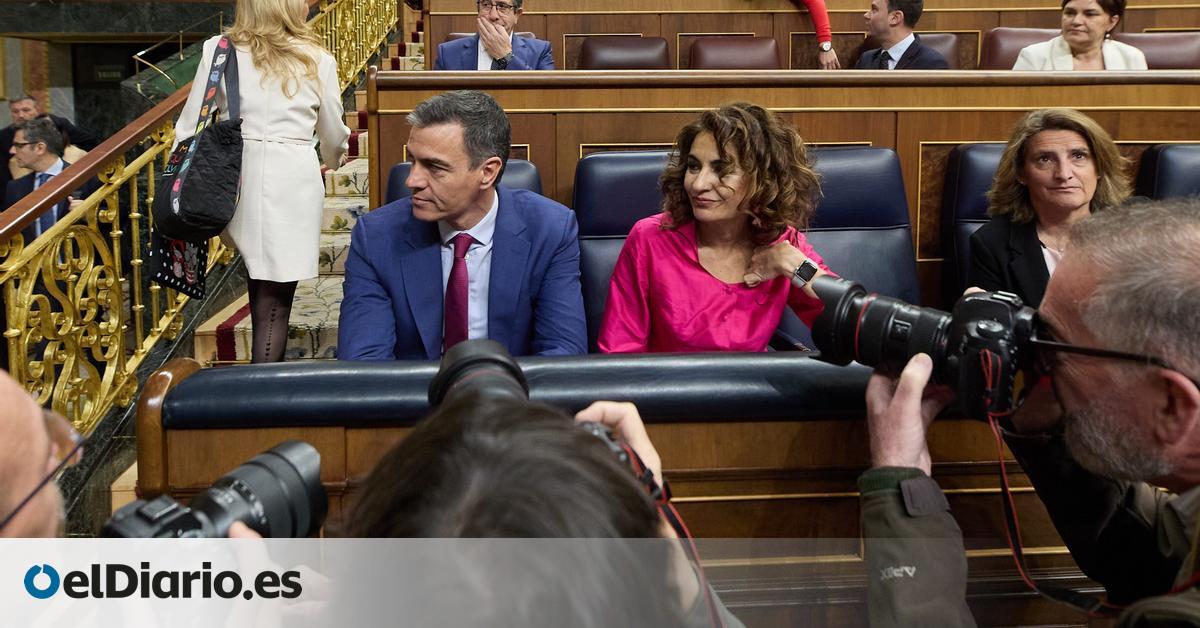
Spanish politics lives immersed in an eternal five-day countdown that does not expire until Monday. The reflection period announced this Wednesday by the President of the Government to decide whether he continues in his position or finally resigns keeps the Government as a whole and the PSOE in complete paralysis. From the qualms about entering areas considered “of their strictest privacy”, and waiting for Pedro Sánchez to speak out, the general slogan in his own party and even in other political or union formations is to push for the president to resist.
“We are proud of him, we need him for Spain to continue moving forward, cheer up president,” the number two socialist and first vice president, María Jesús Montero, concluded her interview this Thursday on Cadena Ser, who assured that these days of uncertainty the closest team The leader of the Executive is limited only to “sending him positive energies.”
Along the same lines, former president José Luis Rodríguez Zapatero even called for a “mobilization” of the bases of the PSOE and progressive citizens to show their support for Sánchez. “We have to react democratically. I ask that all of us who love the PSOE and democracy do something between now and Monday, that democracy prevail over hate,” he also said in Ser, where he warned of the risk that Spain would face circumstances similar to those recently experienced in Portugal. “It can’t happen here, we can’t stay still or be quiet,” he claimed.
For the moment, Zapatero’s call has taken the form of calls for mobilizations in support of Pedro Sánchez spread by militants, sympathizers or even public officials. A support demonstration has been called this Saturday at the socialist headquarters on Ferraz Street, coinciding with the meeting of the Federal Committee that must approve the candidacies for the European elections. An appointment marked by the notable absence of the general secretary. “To defend democracy and our country against hatred,” says that call.
A march in the capital is also announced for this coming Sunday from Atocha to the Congress of Deputies at seven in the afternoon under the motto “their blackmail, their hoaxes and their mafia cannot against democracy and against the people.”
Unions, coalition partners and leftist forces
If it depended on the reaction of his political and parliamentary allies, the leader of the PSOE could already affirm at this point that he has sufficient public support to carry out an issue of trust. Sánchez has obtained, for example, the support of Workers’ Commissions and the UGT. The general secretary of CCOO, Unai Sordo, asked the president not to give in to the claims of “de facto powers,” who, he said, have not assumed “democratic normality.” For his part, Pepe Álvarez has called to defend “the conservation and improvement of the conquests achieved during the administration of Pedro Sánchez” that are at the “germ of this attack on the architecture of the Rule of Law.”
After overcoming the impact of the first hours, the PSOE coalition partners insisted on their messages of support and solidarity towards Pedro Sánchez and the request that he not leave office. Sumar’s spokesperson, Ernest Urtasun, wanted to send a “hug” to the president at the same time that he conveyed a message of “firmness” so that the same thing as with the offensive against Mónica Oltra does not happen. A case that, said the Minister of Culture, ended up bringing down the Botànic Government in the Valencian Community.
A similar message was sent by the leader of the commons Jéssica Albiach, at the start of her campaign as a candidate in the Catalan elections. “It is important to be resilient and firm and understand that they cannot win. We cannot leave this victory to them,” she said to ask the president not to resign.
Sumar’s spokesman in Congress, Íñigo Errejón, went further by demanding a “popular mobilization” of progressive people, what he and his entourage call “the people of the coalition”, to send a message against the operations of the right and the extreme right. “Presidents and political leaders cannot be removed by media and judicial maneuvers,” Errejón said in an interview on La Sexta.
Enrique Santiago, the spokesman for Izquierda Unida in Congress and deputy for Sumar, also took the opportunity to pressure the PSOE with a battery of proposals to reform the General Council of the Judiciary as a way to counteract the “harassment of democracy and institutions based on of the destabilization plan organized by the right of the PP and the extreme right.”
Partners point to a question of trust
The call for the president’s resistance has come in recent hours even from the majority of allied political forces in Congress and that already allowed the inauguration of Pedro Sánchez after the 23J elections. Everyone recognizes in groups such as EH Bildu, Junts or ERC that, if information about the president’s intentions is already arriving in dribs and drabs among his own Moncloa team, that information is almost non-existent to his own parties.
“What we get is pessimistic, but we know almost nothing,” admits a deputy from one of the parties that is part of the investiture majority of the coalition government and who openly recognizes the concern that exists among its ranks about the possibility of that the Executive and the political project it represents decline.
There are those among these allies who prefer to look towards the hypothesis of a question of trust as an escape route from an alley with few exits. “If it is not a tactical move and really the reason is the campaign of the Spanish right against his presidency using his family – I know perfectly well how he feels in this case – and I think his leadership has been weakened as a consequence of this , can always present a motion of confidence and clarify all the doubts that this unforeseen movement has generated,” Junts leader Carles Puigdemont said on social networks.
This possibility has also been pointed out by other parliamentary partners of the Government. “I think talking about this is speculating. If in the end the president does it, what I can assure you is that we will not encourage the inventions of fascism. And if a question of trust is called for this, we have absolutely no reason not to support it,” said ERC spokesperson in Congress, Gabriel Rufián, on Telecinco. Minutes later, the president of the Generalitat, Pere Aragonès, Rufián’s party colleague, preferred to emphasize the need not to enter into speculation.
The leader of the PNV, Andoni Ortuzar, was clearer, considering that a movement like the issue of trust is the “simplest option” to resolve this situation. “The sooner we do everything, the better,” he said in statements to Onda Vasca. In his opinion, the option of dissolving the Cortes and calling elections is more complicated because we would have to wait until May 30, since the Constitution prevents ending the legislature before the first year, and also holding election day at the end of July. . “We already experienced the elections a year ago under these conditions and it was very complicated for everyone,” he noted.
Asked about this matter, the general coordinator of EH Bildu, Arnaldo Otegi, implied that his party would vote in favor of Sánchez’s continuity in a hypothetical question of confidence, because “they are not going to make way for the right.” “Not us,” he said.
Meanwhile, in Moncloa and Ferraz they face the wait as a real political storm to which they try to find the best possible solution. No one, at the end of this Thursday, was yet able to anticipate in what direction the president will speak next Monday. Nor to send a different message than that the resignation of Pedro Sánchez is a more than realistic scenario.
Source: www.eldiario.es

